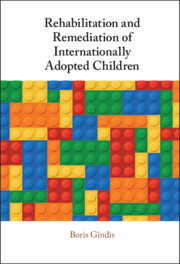Book contents
- Rehabilitation and Remediation of Internationally Adopted Children
- Rehabilitation and Remediation of Internationally Adopted Children
- Copyright page
- Contents
- Acknowledgments
- Introduction
- Chapter 1 Internationally Adopted Children
- Chapter 2 Developmental, Neuropsychological, Psychoeducational, and “Dynamic” Assessment of Internationally Adopted Children
- Chapter 3 Differential Diagnoses and the Structure of School-Based Recommendations for Internationally Adopted Children
- Chapter 4 Developmental Trauma Disorder Rehabilitation in Internationally Adopted Children
- Chapter 5 Cognitive Remediation of Internationally Adopted Children in School and Family
- Chapter 6 Language Remediation of Internationally Adopted Children
- Chapter 7 Academic Remediation of Internationally Adopted Children
- Chapter 8 Creation of Social and Cultural Competence in Internationally Adopted Children
- Chapter 9 Therapeutic Parenting as a Major Force in Rehabilitation and Remediation of Internationally Adopted Children
- Chapter 10 Transitioning to Adulthood Using the Individual Transitional Plan
- Conclusion
- Appendix
- References
- Index
Chapter 1 - Internationally Adopted Children
Development Mediated by Early Childhood Trauma
Published online by Cambridge University Press: 08 October 2021
- Rehabilitation and Remediation of Internationally Adopted Children
- Rehabilitation and Remediation of Internationally Adopted Children
- Copyright page
- Contents
- Acknowledgments
- Introduction
- Chapter 1 Internationally Adopted Children
- Chapter 2 Developmental, Neuropsychological, Psychoeducational, and “Dynamic” Assessment of Internationally Adopted Children
- Chapter 3 Differential Diagnoses and the Structure of School-Based Recommendations for Internationally Adopted Children
- Chapter 4 Developmental Trauma Disorder Rehabilitation in Internationally Adopted Children
- Chapter 5 Cognitive Remediation of Internationally Adopted Children in School and Family
- Chapter 6 Language Remediation of Internationally Adopted Children
- Chapter 7 Academic Remediation of Internationally Adopted Children
- Chapter 8 Creation of Social and Cultural Competence in Internationally Adopted Children
- Chapter 9 Therapeutic Parenting as a Major Force in Rehabilitation and Remediation of Internationally Adopted Children
- Chapter 10 Transitioning to Adulthood Using the Individual Transitional Plan
- Conclusion
- Appendix
- References
- Index
Summary
In this chapter, the notions of child development, complex childhood trauma, and developmental trauma disorder are briefly discussed. They are considered in the context of Vygotsky’s social/cultural theory with the focus on cultural mediation and social connectedness. This is the most adequate and heuristic theoretical context to discuss socially induced trauma, complicated by the dramatic change of culture and language; it gives the framework for restoration of higher psychological functions through the means of social relatedness. Such concepts as “psychological tools,” “direct and mediated learning,” “scaffolding,” “zones of proximal development,” “compensatory education,” the role of language and social context in remediating trauma, and other theoretical postulates are at the core of the theoretical approach of this book. The remedial model suggested in the book represents a multidisciplinary approach from mostly neurological to mostly sociocultural domains.
Multiple and long-term traumatic experiences against the background of neurological weaknesses and impairments result in distorted development, described as developmental trauma disorder (van der Kolk, 2005). The result is a severely compromised neurodevelopment that slows down and distorts the integration of sensory, emotional, and cognitive systems into a cohesive whole. As a group, internationally adopted children are the extreme exemplum of complex childhood trauma. Contrary to the common view, the change from an objectively adverse pre-adoption social situation of development to an objectively favorable post-adoption condition does not cut the chain of traumatic impacts. The adjustment to a new physical, cultural, social, and linguistic environment is traumatic by itself: the old distressing experience forms the background, but the new trauma of not fitting in, not connecting with, and not being accepted by the current social milieu creates a new and more subjectively genuine trauma. The long-lasting consequences of early traumatization continue to affect the development but are now mediated by the mounting challenges of adjustment and competition within a new social/cultural environment.
Developmental trauma disorder (DTD) in older (adopted as preschoolers and up to high school students) international adoptees includes such psychological symptomatology as dysregulated high psychological functions, distorted “internal working model,” permanent state of hyper-arousal and/or hypo-arousal, lack of developmental competence (“mixed maturity”), difficulties in forming and sustaining social connectedness, and distorted attachment to adoptive family members. Post-orphanage behavior syndrome (“survival behavior patterns”) are considered in the context of DTD. The chapter is concluded with an analysis of resilience, recovery, and developmental catch-up as the result of post-adoption remediation and rehabilitation.
- Type
- Chapter
- Information
- Publisher: Cambridge University PressPrint publication year: 2021

